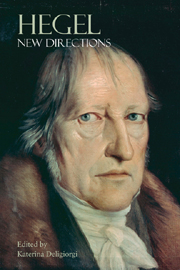Book contents
- Frontmatter
- Contents
- Contributors
- Acknowledgements
- Abbreviations
- Introduction: On reading Hegel today
- 1 Hegel on conscience and the history of moral philosophy
- 2 The apperceptive I and the empirical self: towards a heterodox reading of “Lordship and Bondage” in Hegel's Phenomenology
- 3 Hegel, McDowell and recent defences of Kant
- 4 Substance, subject and infinity: a case study of the role of logic in Hegel's system
- 5 Dialectic as logic of transformative processes
- 6 Hegel, ethics and the logic of universality
- 7 Recognition and reconciliation: actualized agency in Hegel's Jena Phenomenology
- 8 The contemporary relevance of Hegel's practical philosophy
- 9 Catching up with history: Hegel and abstract painting
- 10 New directions in Hegel's philosophy of nature
- 11 Hegel and the gospel according to Immanuel
- 12 What is conceptual history?
- 13 On Hegel's interpretation of Aristotle's psyche: a qualified defence
- Bibliography
- Index
5 - Dialectic as logic of transformative processes
- Frontmatter
- Contents
- Contributors
- Acknowledgements
- Abbreviations
- Introduction: On reading Hegel today
- 1 Hegel on conscience and the history of moral philosophy
- 2 The apperceptive I and the empirical self: towards a heterodox reading of “Lordship and Bondage” in Hegel's Phenomenology
- 3 Hegel, McDowell and recent defences of Kant
- 4 Substance, subject and infinity: a case study of the role of logic in Hegel's system
- 5 Dialectic as logic of transformative processes
- 6 Hegel, ethics and the logic of universality
- 7 Recognition and reconciliation: actualized agency in Hegel's Jena Phenomenology
- 8 The contemporary relevance of Hegel's practical philosophy
- 9 Catching up with history: Hegel and abstract painting
- 10 New directions in Hegel's philosophy of nature
- 11 Hegel and the gospel according to Immanuel
- 12 What is conceptual history?
- 13 On Hegel's interpretation of Aristotle's psyche: a qualified defence
- Bibliography
- Index
Summary
Unlike other parts of Hegel's philosophical system, the Logic raises for the interpreter not only detailed questions concerning particular arguments and the stages of its construction but also the more general, indeed preliminary problem regarding the subject as well as the overall aim and ambition of its project. Ultimately, this problem challenges the status of the Logic as “logic”. For, it is certainly legitimate to ask whether Hegel's dialectic is really “logic” in the sense understood in the tradition preceding and following Hegel; or to ask what kind of logic dialectic is. This question has been raised time and again. Attempts to answer it include claims that Hegel's logic is an ontology that either returns to pre-Kantian metaphysics or offers a renewal of metaphysics after Kant's critique; that it provides an epistemological theory intended to guide the development of all other philosophical disciplines; that it amounts to speculative mystification of autarchic thinking, or that it is a theory of meaning or a theory regarding the pragmatic institution of norms. These and analogous accounts generally stress one single aspect of Hegel's logical project leaving out the more complex constellation of reasons that he provides as justification of its overarching task. It follows that, whatever their respective merits, the explanatory potential of these readings is limited to the consequences of one single thesis: ontology versus epistemology versus theory of meaning and so forth. On all these accounts, much is left unconsidered. And the central question still remains open.
- Type
- Chapter
- Information
- HegelNew Directions, pp. 85 - 104Publisher: Acumen PublishingPrint publication year: 2006
- 1
- Cited by

